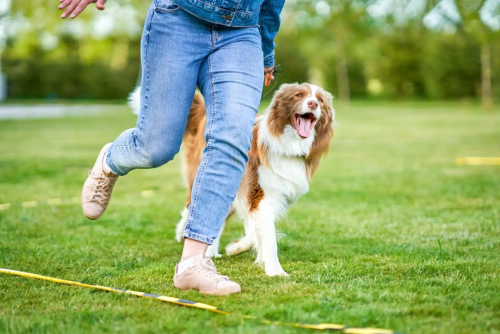 Having a relaxed and stress-free dog is a goal that every pet owner aspires to achieve. Just like humans, dogs can experience stress, which can impact their overall well-being and behavior. Stress in dogs can manifest in various ways, such as excessive barking, destructive behavior, loss of appetite, and even physical symptoms like hair loss or digestive issues.
Having a relaxed and stress-free dog is a goal that every pet owner aspires to achieve. Just like humans, dogs can experience stress, which can impact their overall well-being and behavior. Stress in dogs can manifest in various ways, such as excessive barking, destructive behavior, loss of appetite, and even physical symptoms like hair loss or digestive issues.
Therefore, it's crucial to incorporate practices that can help your furry friend unwind and remain calm. Here are some simple tips to help your dog relax and de-stress:
1. Establish a Routine
Dogs thrive on routine, providing them with a sense of stability and security that can significantly reduce stress and anxiety. A set schedule for feeding, walking, and playtime creates predictability in their day-to-day lives, allowing them to feel more in control of their surroundings.
And, when it comes to dog training in Salt Lake City, UT, having a consistent routine helps foster good behaviors and habits in your dog. So, set regular mealtimes, walks, and bedtime, and stick to them. By doing so, you'll be giving your dog the solid foundation they need for a happy and peaceful life.
2. Create a Safe Space
Designate a quiet and comfortable area in your home where your dog can retreat to when they feel overwhelmed or anxious. This space should be away from the hustle and bustle of the household and should include familiar items like their bed, toys, and water bowl. Allow your dog to access this safe space whenever they need to unwind.
3. Provide Regular Exercise
Regular exercise is essential for maintaining your dog's physical and mental well-being. Engage your dog in daily walks, playtime, or other forms of physical activity suitable for their breed and age. Exercise helps to release endorphins, which are natural stress relievers, and also promotes better sleep, which is crucial for reducing stress.
4. Practice Mindful Petting and Massage
Just like humans, dogs can benefit from the calming effects of touch. Spend quality time petting and massaging your dog gently and soothingly. Focus on areas like the ears, chest, and back. Massage has been shown to reduce stress hormones and promote relaxation in dogs.
5. Use Calming Products
There are various products available in the market that can help calm anxious dogs. Calming sprays, diffusers, and pheromone collars can create a relaxing environment for your dog. Additionally, consider investing in anxiety-reducing clothing, such as a Thundershirt, which applies gentle, constant pressure, providing a calming effect for many dogs.
6. Provide Mental Stimulation
Mental stimulation is as crucial as physical exercise for a dog's well-being. Introduce puzzle toys, interactive feeders, and obedience training to keep your dog's mind engaged. Mental stimulation helps to prevent boredom and anxiety, leading to a more relaxed and contented dog.
7. Maintain a Balanced Diet
A well-balanced diet is essential for your dog's overall health and can also affect their stress levels. Ensure your dog's food is nutritious and suited to their age, size, and breed. Avoid sudden changes in diet and provide treats in moderation. Proper nutrition contributes to a healthy gut, which plays a significant role in a dog's emotional well-being.
8. Use Aromatherapy
Certain scents can have a calming effect on dogs, just as they do on humans. Lavender, chamomile, and valerian are known for their relaxing properties. You can use essential oil diffusers, sprays, or scented candles in your home to create a soothing atmosphere for your dog. Always make sure the products you use are pet-safe and properly diluted.
9. Keep Your Dog Socialized
Regular socialization with other dogs and people is crucial for preventing anxiety and fearfulness in dogs. Organize playdates, visit the dog park, or enroll your dog in obedience classes to help them build positive associations with different environments and situations.
10. Stay Calm and Relaxed Yourself
Dogs are incredibly intuitive and can pick up on their owner's stress and anxiety. Stay calm and composed, especially during stressful situations, as your dog will look to you for reassurance. Your relaxed demeanor can have a significant impact on your dog's stress levels.
In Conclusion
Helping your dog relax and de-stress doesn't have to be complicated. By incorporating these simple tips into your daily routine, you can create a calm and stress-free environment that will benefit both you and your furry friend. Remember, every dog is unique, so it may take some time and patience to find the right combination of techniques that work best for your dog. By providing a stable routine, a safe space, regular exercise, and lots of love and attention, you can help your dog lead a happy, healthy, and stress-free life.











